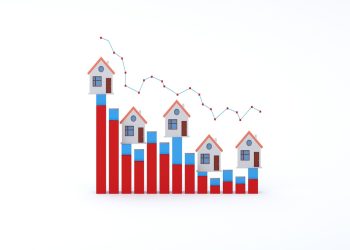Editor’s Note: The Playbook is an RISMedia bi-weekly segment centering on what brokers and agents are doing to ensure they not only survive but thrive in these challenging times. Industry professionals explain the strategies they’re employing and unique ideas they’ve formulated. Tune in every other Thursday for another addition to the series.
These days, with clients and listings harder to come by compared with the last few years due to inventory issues and rising mortgage rates, utilizing a customer relationship management (CRM) system is more important than ever. In tandem with trying to keep tabs on people in your database, the technology baked into a CRM can perform many communication tasks, saving REALTORS® crucial hours that can be spent with clients as they set the stage for a profitable second half of the year.
For newer agents and those not already using one of the several CRMs available, the software stores organized data about leads and customers, such as personal information, communication and purchase history. It helps promote the continuity of an agent’s relationship with leads and customers. CRM tools are becoming more and more important to the daily work of real estate agents.
“It really is about how you manage your database and the people you are engaging with, whether they’re on the buyer or seller side,” says Stuart Sim, vice president of Industry for Chime, a CRM platform for real estate agent teams and brokers. “We think about long-term conversion of the leads you’re bringing into your system. So text messaging, email messaging, social media messaging, content distribution, content management and placement and transaction management. Anything a real estate agent or broker will do in a day is available within Chime.
“Agents can be dealing with 12 to 15 different types of technology. We’re trying to pull that all together into one to make life easier. One of the major issues we have as an industry is that only 12% – 14% of consumers transact twice with the same REALTOR®. We’re trying to help grow that number, grow that percentage, so you have a lifelong relationship with someone who is going to probably transact in real estate seven to 10 times during their lifetime.
The database connection
Marketing is made up of numerous tedious tasks. Automating them is a smart way to improve the efficiency of everyone that connects with customers and leads. Along with a CRM, an agent’s database must be grown and nurtured, updated and used in order to stay top of mind for anyone in your sphere thinking of purchasing real estate.
“People do business with people they know, like and trust,” asserts Jackie Louh, COO at Lamacchia Realty Inc. “So how do agents get to that point? You can’t be a secret agent. Too often we hear that ‘oh well, my database is up here in my head.’ That’s not really going to help you out. That means you’re not using it to the best of your ability.”
That logic is seconded by Jemila Winsey, CEO and principal broker at ERA Legacy Living, who feels that the lifetime value of a client today is over $100,000.
“Some think that the transaction ends when you get to the closing table and get your check, but that’s just the beginning of the relationship,” she says. “If you get in my funnel, I’m not letting you out. As I continue to work these relationships, I don’t have to work as hard, as my business grows over the years. If you don’t have a database, you don’t have a business. Period.”
It takes determination and effort to build up a database, which should not be especially difficult for REALTORS®, who, by nature, have to be fairly aggressive to succeed.
“Call your friends, your family, people who know and trust you, and then extend that to having conversations with whoever you meet,” says Winsey. “I try to have as many as five to 10 conversations a day, so they know that I’m in the business of real estate. You’re a people person, so introduce yourself and tell them what you do.”
Building up a database and then incorporating it into a CRM is what Whitney Finn LaCosta, CEO of Howard Hanna | Coach REALTORS®, recommends.
“I don’t think enough agents work real estate like a business,” she notes. “And in order to work it like a business, you have to have the right systems in place. A CRM creates a way to put people in, organize them, put them in groups and connect with them on a regular basis.
“If an agent’s business is down 10%, how can they get 10% or 20% more people in their CRM? Because the more people you touch, the more business you’re going to get. Most companies are down a little bit because there are not as many transactions as there have been in the recent past. If you increase your database, you can make up for that. It’s a simple solution. More connections, more business, more money.”
Once the database has a healthy number of people within it, that’s when a good CRM takes over.
“The CRM is going to do a lot of the heavy lifting,” says Sim. “So as you grow over the years, let’s say you have 1,500 people in your database. The average REALTOR® is only going to call two to three hundred of them every year. What happens to the rest is where the CRM is going to come in and take on a lot of the workload, whether that’s email marketing, text marketing or getting really good social media placement.”
Getting agents to use a CRM may not be easy, especially those set in their ways.
“It can be intimidating to people, the CRM; it’s the fear of the unknown, and nobody wants to seem like they don’t know what they’re doing,” asserts Louh. “But the more you put it in front of the agents, the more you train them on it, the more receptive they’ll be to using it.”
“One of the things we did was create a department of people that specifically helps agents with their CRM,” says Winsey. “We’ve also made sure that every one of our admins is well-versed in how to use the CRM. If an agent has a transaction, they bring in the paperwork, the admin shows them how to put in the anniversary contact, so in year one, year two, they’re receiving a contact from the agent about a happy anniversary. We try to do as much as we can for the agents to help them get past that first learning curve of actually using it, learning it and how to set it up.”
Sim cautions that even an expert user of CRMs must still do the old-fashioned grunt work to be successful as a REALTOR®.
“Some people think a CRM is going to magically turn their business around, but it requires a lot of hands-on activity on top of the automations that are taking place behind the scenes,” he says. “Inputting the right information into the CRM is most important. If you’re adding bad information, like names spelled wrong, addresses wrong, emails wrong, then you’re not going to get the traction you might expect.”
Key takeaways
- Everybody thinks that the transaction ends when you get to the closing table and get your check. That should be the beginning of the relationship.
- With a CRM, the more you put it in front of your agents, the more you train them on it, the more receptive they’ll be to using it.
- Make sure the information that’s going into a new CRM is accurate and you’re using the right follow-ups for your business.
- Talk to five people a day in your database as well as others outside of it. Ask about family, occupations and recreation. Make sure they know what you do.












